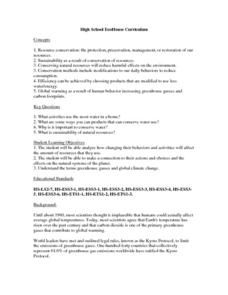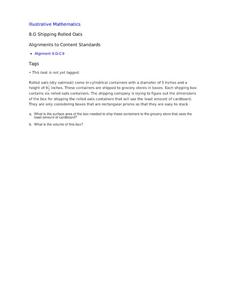Scholastic
Study Jams! Estimate Whole Numbers
Watch animated slides as RJ explains how to round numbers to the nearest ten and thousand. Viewers then get a chance to try it themselves.
Scholastic
Study Jams! Multiplication of Decimals
How do you handle a decimal point when it appears in a multiplication problem? The answer is explained with a captivating and interactive slide show.
Scholastic
Study Jams! Place Decimal on a Number Line
Through four steps, three different time values for a 100-meter run are arranged on a number line in order to practice ordering decimal numbers. The price of two sports drinks are also compared. All of this comes in narrated and animated...
Scholastic
Study Jams! Addition & Subtraction of Decimals
So current with preteens is the topic of downloading tunes into their computers! In a relatable lesson, viewers are taught to figure out if Zoe can afford to purchase two songs if she has $3.00 left to her credit. Mia talks them through...
Scholastic
Study Jams! Place Value of Decimals
Here is a clear explanation of decimal place value using batting average as the example. Narrated and animated steps are clicked on so that learners can progress at their own pace. Consider having fifth graders interact with this website...
Scholastic
Study Jams! Making Change
This dreamy resource has little ones computing the change on the purchase of an ice cream cone. Mia describes each step in two methods: subtraction of decimals and counting up from the sale price.
Scholastic
Study Jams! Compare Money Amounts
Elementary money makers are walked through five steps to compare two different amounts. RJ speaks slowly as animations display his explanations. He compares the price of a New York magnet to the amount of money his cousin has on hand to...
Scholastic
Study Jams! Percents
Sam's mom is a bowling woman and her birthday is around the corner. Can Sam afford the shirt in the store window for her? Mia helps him solve a multi-step percent problem to figure it out!
Scholastic
Study Jams! Least Common Multiple
RJ instructs your sixth graders in two different methods of determining least common multiples. The first is by listing several multiples of each number, and the second is by drawing factor trees. This is an ideal flipped classroom...
Scholastic
Study Jams! Ratio
What is the ratio of wins to total games for Mia's soccer team? RJ teaches viewers how to figure it out with a step-by-step procedure. He shows them three different ways to represent ratios: word form, ratio form, and fraction form.
Scholastic
Study Jams! Geometric Patterns
Here is a fun online activity that learners can use to practice imitating patterns! Along the way, they are exposed to the names of geometric shapes including rhombus, hexagon, octagon, and decagon.
Scholastic
Study Jams! Order of Operations
Please excuse my dear Aunt Sally! Sort of like an animated slide show, this lesson walks fifth graders through the order of operations. Also included are a sing-along karaoke video, key vocabulary with definitions, and a seven-question...
Scholastic
Study Jams! Ordered Pairs
Using an amusing amusement park, Sam describes how it is a coordinate plane and how to graph an ordered pair. Perfect for beginners, the animation moves on to point out a tip using the first quadrant of an empty coordinate plane.
Exploratorium
Soda Can Mirrors
Here is an entertaining and illuminating lesson on morphed images. Middle schoolers make cylindrical mirrors by wrapping soda cans in reflective mylar. First, they try to determine what the images are that are embedded in the plan by...
Exploratorium
Building Three-Dimensional Structures
Are you looking for a good 3-D geometry lesson that includes hands-on activities for your middle schoolers? Look no further than this one! Pupils use centimeter grid paper embedded in the plan, along with detailed construction...
Institute of Electrical and Electronics Engineers
Popsicle Bridge
Using popsicle sticks and glue, groups must work together to design and build a bridge that can support weight and is aesthetically pleasing. The lesson plan begins by learners reading about different features of bridge architecture,...
Curated OER
High School EcoHouse Curriculum
How has the level of carbon dioxide changed over recent years, and what is contributing it? Groups work together to research and present their findings in a creative way. Also built into the lesson is a visit to a sustainable house, but...
University of Wisconsin
Measuring Slope for Rain Gardens
The slope of the land is an important feature when considering the erosion that will occur. In this resource, which is part of a rain garden unit, learners calculate the slope of the proposed garden site. Even if you are not planning a...
Curated OER
Shipping Rolled Oats
What better way to start your day than with a box of oatmeal? Or what better way to start your geometry class than by calculating its volume? Eighth graders discover just how practical volume computation can be in business and in breakfast!
Curated OER
Two Triangles' Area
Need an activity for teaching the Pythagorean Theorem? Geometry juniors apply the Pythagorean theorem to two triangles to determine a final calculation.
Curated OER
Hand Span and Height
Is there a relationship between hand span width and height? Statisticians survey each other by taking measurements of both. A table that can hold data for 24 individuals is printed onto the worksheet, along with questions for analysis....
Curated OER
8.SP.1Texting and Grades I
Here is a fitting question for middle schoolers to consider: Is there a relationship between grade point average and frequency of sending texts? Starting statisticians examine a scatter plot and discuss any patterns seen.
Illustrative Mathematics
Oakland Coliseum
Help algebra learners relate a real-life function that happens at the Oakland Coliseum every time the Raiders play. The resource states that the revenue of the Oakland Raiders home games is a function of the number of seats sold and the...
Curated OER
Triangle's Interior Angles
Given a pair of parallel lines and a triangle in between, geometers prove that the sum of the interior angles is 180 degrees. This quick quest can be used as a pop quiz or exit ticket for your geometry class.















